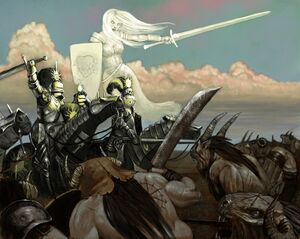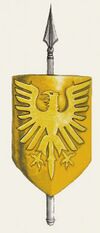Myrmidia: Difference between revisions
No edit summary |
|||
| Line 5: | Line 5: | ||
Also she seems to be highly worshiped by the Tempest Lords Stormhost of the Stormcast Eternals, a bunch of nobles who actually got off their ass and did something with their lives, so she ain't out of followers for the time being. | Also she seems to be highly worshiped by the Tempest Lords Stormhost of the Stormcast Eternals, a bunch of nobles who actually got off their ass and did something with their lives, so she ain't out of followers for the time being. | ||
In [[Warhammer 40k]] her closest equivalent is, or rather was, an obscure war goddess named Mythrus who was mentioned in one of the [[Siege of Terra]] books and who counted among her worshippers the grandson of one [[Ollanius Pius]]. Despite [[The Emperor]] having banned all religions and | In [[Warhammer 40k]] her closest equivalent is, or rather was, an obscure war goddess named Mythrus who was mentioned in one of the [[Siege of Terra]] books and who counted among her worshippers the grandson of one [[Ollanius Pius]]. Despite [[The Emperor]] having banned all religions and pseudo-religious systems (excluding his Imperial Truth and the Machine Cult) due to fear of them fueling the [[Chaos Gods]] Mythrus was apparently still being worshipped by secret groups in the [[Imperial Guard]] up till the [[Horus Heresy]] due to humans instinctively having a strong desire to look up to a higher power for guidance, something big E couldn't seem to comprehend despite his millennia of life. As an aside it’s possible the Emperor had some sort of connection with the goddess as the infamously disliked Ultramarine animated movie featured a similarly named book of warp magic called the Liber Mithrus that was supposedly entrusted to the Imperial fists for safe keeping upon their founding. However given the poor quality of the movie it’s possible the name was just an oversight on GW’s part. In any event at the end of the heresy [[Horus]] got killed, [[The Emperor]] got put on life-support, and the [[Imperium of Man]] replaced the Imperial truth with worship of [[The Emperor]] as a god leaving no room for the cult of Mythrus which was wiped out. | ||
==Priests== | ==Priests== | ||
{{whfb-stub}}{{NeedsImages}} | {{whfb-stub}}{{NeedsImages}} | ||
Revision as of 06:42, 1 February 2023


A goddess in Warhammer Fantasy worshiped by the men of Tilea and Estalia, as well as the Empire in a reduced capacity. She's an outright knockoff of Athena, being a goddess of strategy and the chain of command. Her followers are usually rivals of the main gods of the setting (Ulric and Sigmar respectively), who are mainly about going on human WAAAGH!s against Chaos worshipers and the Undead. She is the daughter of Morr, the human god of the dead, and Verena, the goddess of justice and scholars. According to 4th edition Warhammer Fantasy Roleplay, a language 'Battle Tongue' used by human soldiers in, well, battle was created by Myrmidia herself. She has a number of knightly orders, but the most prominent is the Order of the Blazing Sun, which produces classically heavily-armored knights whose real claim to fame is being exemplars of her tenets that are some of the best tacticians/strategists around. Her sister is Shallya, goddess of mercy and healing. She apparently managed to survive the End Times and live on into the Age of Sigmar as there is mention of a gender-neutral knightly order ”the Order of the Ardent Star” that once worshipped Myrmidia in their homeland of the Flamescar Plateau in the Realm of Aqshy. Said knights wore black and gold, rode into battle on giant murder lizards called demidroths (who sadly did not breathe fire like their larger magmadroth cousins) and took pride in a banner with a star on it that supposedly was given to them during the Age of Myth by the goddess (hence their order’s name). Also despite being relatively near to them geographically the order did not have particularly good relationship with the Fyreslayers of Hermdar lodge, something which would come back to bite them. See despite their battle cry being “Stella Invicti” or the “Unconquerable Star” and their past victories in a thousand battles beforehand, without any allied support they were all but obliterated by a horde of Khornate warriors lead by the female Khornate champion Sulkotha Godspite during the Age of Chaos. Godspite, wielding a spiked demonic chain whip, a cursed demonic blade and looking like she stepped out of a heavy metal album cover due to her wearing spiked armor with a breast plate etched with demonic faces with burning eyes, first broke the order’s fortress “the Redoubt” located at Drakemount before moving on and finally killing the order’s leader Sir Karon and most of his remaining subordinates at their last stronghold “the Chapel Fortress” which lay to the west of the Desert of Glass. The only survivor of the order’s massacre was a single female knight named Sir Anaea who managed to escape from the slaughter with the order’s sacred banner before hiding it in the mountains nearby.
Also she seems to be highly worshiped by the Tempest Lords Stormhost of the Stormcast Eternals, a bunch of nobles who actually got off their ass and did something with their lives, so she ain't out of followers for the time being.
In Warhammer 40k her closest equivalent is, or rather was, an obscure war goddess named Mythrus who was mentioned in one of the Siege of Terra books and who counted among her worshippers the grandson of one Ollanius Pius. Despite The Emperor having banned all religions and pseudo-religious systems (excluding his Imperial Truth and the Machine Cult) due to fear of them fueling the Chaos Gods Mythrus was apparently still being worshipped by secret groups in the Imperial Guard up till the Horus Heresy due to humans instinctively having a strong desire to look up to a higher power for guidance, something big E couldn't seem to comprehend despite his millennia of life. As an aside it’s possible the Emperor had some sort of connection with the goddess as the infamously disliked Ultramarine animated movie featured a similarly named book of warp magic called the Liber Mithrus that was supposedly entrusted to the Imperial fists for safe keeping upon their founding. However given the poor quality of the movie it’s possible the name was just an oversight on GW’s part. In any event at the end of the heresy Horus got killed, The Emperor got put on life-support, and the Imperium of Man replaced the Imperial truth with worship of The Emperor as a god leaving no room for the cult of Mythrus which was wiped out.
Priests
 This page is needs images. Help plz. This page is needs images. Help plz. |
Knightly Orders
 This page is needs images. Help plz. This page is needs images. Help plz. |
The "Myrmidons",Knights of the Blazing Sun,and Knights of the Verdant Field have Myrmidia as their patron.
In Warhammer Fantasy Roleplay
One of the largest exposes on the Cult of Myrmidia in the context of Warhammer Fantasy Roleplay can be found in the splatbook "Up In Arms!", which examines the soldiers and mercenaries of the Old World. Here, the summary of the cult goes thus:
- Seat of Power: The Archecclesiastium, the chief temple in Magritta
- Head of the Cult: La Aguila Ultima Isabella Giovanna Luccelli
- Primary Orders: Order of the Blazing Sun, Order of the Eagle, Order of the Righteous Spear
- Major Festivals: No fixed holy days, but celebrations to Myrmidia are held at the beginning and end of campaigns and it is common practice to sacrifice to her before and after a battle
- Popular Holy Books: Bellona Myrmidia, Bellum Strategia, The Book of War
- Holy Symbols: A spear behind a shield, an eagle
Myrmidia's faith is described as being a confusing tangle of historical fact and pure myth, very akin to that of Sigmar; like Sigmar, Myrmidia is believed to have been a real god-queen who once presided over a great empire in the southern regions of the Old World, covering the lands now known as Tilea and Estalia. Interestingly, Wight-guarded barrows from the Old World have occasionally been looted to reveal what are obviously sacred statuettes depicting a warrior woman wielding stone arms and armor, so it's an indisputable fact that some kind of warrior goddess was worshipped in the pre-Sigmar cultures of the Old World... the debate is whether or not this goddess was actually Myrmida. For obvious reasons, Imperial theologians tend to be very dismissive of the legend of Myrmida, often going so far as to suggest that her legends are simply poor imitations of Sigmar's legends and that the "southern empire" is a pure fiction. The smart ones don't say that where any Tilean or Estalian can hear them!
One of the more interesting aspects of Myrmidia's faith is that there's actually a schism in it. Whilst her Cult is widely spread in both Tilea and Estalia, these two nations have very different perspectives on several major views about the goddess and her lore, not helped by the fact that her three holy books each present very all different accounts of her origins and place varying emphasis on the importance of her story. Whilst such distinctions may be seen as pointless or arbitrary to outsiders, they are taken very seriously by Tileans and Estalians, and are the source of bitter contention, which keeps the cult on the verge of schisming. It has even led to everything from duels between champions of the rival sects to full-blown wars, and the fall of the Reman empire is sometimes attributed to the religious schism between Tilean and Estalian worshippers of Myrmidia. Is this perhaps a tongue-in-cheek nod to the split of Christianity between Catholics and Orthodox? Well, we wouldn't past them...
So, what are the big issues and the differing views? Well...
| Issue | Tileans | Estalians |
|---|---|---|
| Centre of cult authority | L’Ultima Aquila Isabella Giovanna Luccelli is the head of the cult, and ought to move its centre to the High Temple in Remas | La Aguila Ultima Isabella Giovanna Luccelli is the High Priestess at The Archecclesiastium, the chief temple in Magritta |
| Legitimacy of Bellona Myrmidia | Literal truth of Myrmidia’s life and achievements | A collection of folklore and fairy tales, of spiritual importance but not historical fact |
| Legitimacy of Bellum Strategia | Apocryphal ramblings that may inspire the faithful but hold no true veracity | The holy revelation of Myrmidia’s manifestation as a goddess incarnate in Magritta |
| Legitimacy of The Book of War | An important work in understanding the precepts a good Myrmidian ought to abide by, and an account of twelve battles fought under the generalship of Myrmidia | An important work in understanding the precepts a good Myrmidian ought to abide by, and an account of twelve battles fought under the guidance of generals inspired by Myrmidian principles |
| Myrmidia was previously a goddess of Civilisation and companion to Tylos | Commonly understood to be fact, or at least a respected legend | Dismissed as a Tilean myth |
| Belief that a Myrmidian classical age... | began in Remas, led by Myrmidia herself, and conquered Estalia | began in Magritta, was either led by Myrmidia herself or those who were inspired by her, and conquered Tilea |
| Enjoy the favour of... | the Order of the Eagle | the Order of the Blazing Sun |
| Belief that Myrmidia spent time as a mortal... | is hugely important and proper to all true Myrmidians | is optional and of secondary importance to understanding what she represents |
Although facing resistance from the Cult of Ulric and the more hardcore Cultists of Sigmar (though the broader Sigmar church actually welcomes Myrmidia's faith, if largely to spite Ulricans), the cult of Myrmidia is spreading across the Empire, in particular gaining a lot of ground amongst the women of the Empire, which might be another Christianity reference; women were often the first to convert to that faith in reality. They appreciate Myrmidia's emphasis on fighting smarter, not harder, and her advocation of minimizing casualties. A common saying amongst Myrmidian women of the Empire goes "Sigmar takes you to war, but Myrmidia brings you back".
...Obviously, most Sigmarites get very grumpy at hearing this parable.
Tenets of Myrmidia
According to her writeup in "Up At Arms", the faith of Myrmidia fundamentally revolves around three central concepts; Honor, Knowledge and Aesthetic Flair.
Of these concepts, the Myrmidian concept of Honor is the deepest and most complex - and the one most ridiculed by Ulricans and hostile Sigmarites, for Myrmidian honor champions efficiency and compassion over brute strength and martial pride. In Myrmidia's eyes, honorable behavor is to avoid wasting soldiers' lives, win battles quickly and decisively, extend respect to the dead, submit to one's master - but disobey them if they prove corrupt, redress wrongs, right injustices, and protect the weak.
Knowledge is sacred to Myrmidia, and her adherents both dedicate themselves to seeking out ancient or lost texts relating to the lore and art of battle, and strive to improve themselves and their combat abilities.
Finally, one's martial equipment should be crafted and cared for to bring it to the pinnacle of its beauty. Armor should be polished, blades honed to a razor's edge. No Myrmidian worthy of their faith would allow their gear to be rusty or subpar!
Boiled down to their bluntest, these are the Myrmidian commandments:
- Act with honor and dignity in all matters.
- Respect prisoners of war and never kill an enemy who surrenders.
- Show no mercy to the unrepentant enemies of Humanity.
- Obey all honorable orders.
- Preserve the weak from the horrors of war.
Gallery
-
-
-
Warriors of the Cult of Myrmidia
-
A priestess of Myrmidia.
| The Gods of the Empire |
|---|
| Manann - Morr - Myrmidia - Ranald - Rhya - Shallya - Sigmar - Taal - Ulric - Verena |


